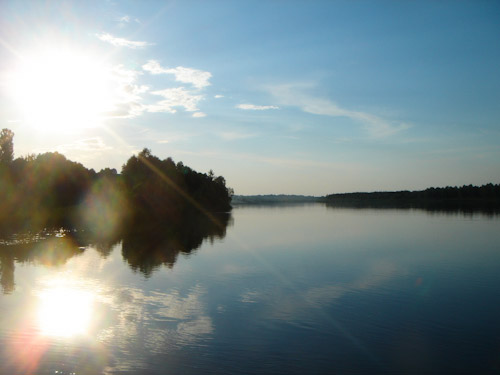
In ITF‘s interview with Andrew Blackwell, the author of the book Visit Sunny Chernobyl talks about his travels to the world’s most polluted places. One point he raises is that there’s no way to return the environment to the “pure, pre-human phase” of its existence — and that this is a misguided ideal to begin with.
Inside the U.S., in the environmental movement, there is this foment right now with traditionalists, who draw their spiritual energy as it were from an idea of “pure nature” and restoring as much of the environment to a pure, pre-human phase as possible. That’s not the literal goal, but that is sort of the ideal that drives their entire enterprise.
Then you have these modernist folk, who believe that that is an impossible ideal: holding that ideal actually will leave you to miss out on all kinds of opportunities and will waste your time and energy on causes that aren’t worth it and harmful. They also believe that, yes, ideally it would be great to have that idea of purity and wildness at the center, but we are so far past that being the reality that there has to be something else motivating environmentalism. And what that is, is a recognition that human civilizations are part of nature and that there is no way of knowing what it means to have a pristine environment — and that it doesn’t exist anyway in an era of climate change.
Also, it’s just another form of separation. We’re still seeing nature as separate from human civilization, and that has been half the problem right there. And so the goal really is to find an integrated idea of what a healthy environment is.
Perhaps it says something about humanity’s self-centered view of the world that the catchphrase for the environmental movement is “save the planet.” Planet Earth doesn’t need saving. If life can survive in the pitch-dark, pitiless abyss of the deep ocean, or recolonize remote islands after volcanic explosions wipe the landscape clean, or — as Blackwell points out — thrive in irradiated zones where human beings now fear to tread, then you can imagine that life will eventually adapt to whatever nightmare scenario Homo sapiens visits on its terrestrial neighborhood. (Of course, species higher up on the food chain will vanish — as they already are on track to do — but give the Earth a few more billion years, and perhaps complex life can evolve once again even on an inhospitable, dangerously polluted planet.)
As Blackwell points out, the environment in the modern age is never “pristine.” And that seems to fit with the way of nature, with its (evolutionary) love of mixing and hybrid forms. Nature revels in the “impure.” As the Buddhist monk Thich Nhat Hanh writes, flowers arise from mud; the idea of “purity” is in our minds. Regardless of what we do, nature will find a way of dealing with it, because it is, at heart, impure and impermanent.
The point is, life on Earth doesn’t need us; we need life on Earth. Other species on the planet can play a long game, and wait us out, with time and evolution on their side. We can’t. And yet in the United States and many other countries, the popular will is weak to do something about climate change and environmental degradation more generally.
In part, it may be a question of how we frame the problem. Two of the most potent symbols of climate change are melting glaciers and starving polar bears — not the kind of imagery that does a good job of drawing people to see the very real threat to their daily lives. Ironically, even phrases like “saving the planet” tend to make environmental problems appear distant from everyday, “real” concerns. They make environmentalism seem like something you do off in a forest somewhere, away from other people: campaigning to protect far-off waterways and species, crusading like some kind of modern-day monk on behalf of a utopian, preindustrial past. In reality, the core concern of the environmental movement is the most pragmatic of goals: ensuring that we human beings have the food, dry land, and clean water and air that we need, say, to live.
Perhaps it’s time to change the name of “Earth Day.” It’s not a day to celebrate some abstract ideal. It’s a day of judgment. It’s not about the Earth and its survival. It’s about human beings. It’s about whether we are smart enough to value the neighborhood we’re lucky to live in — or content to watch it burn around us.
Victor Tan Chen Victor Tan Chen is In The Fray's editor in chief and the author of Cut Loose: Jobless and Hopeless in an Unfair Economy. Site: victortanchen.com | Facebook | Twitter: @victortanchen
- Follow us on Twitter: @inthefray
- Comment on stories or like us on Facebook
- Subscribe to our free email newsletter
- Send us your writing, photography, or artwork
- Republish our Creative Commons-licensed content

